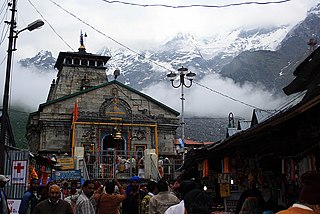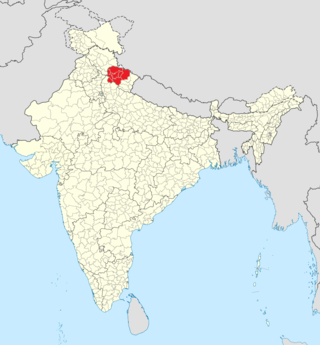
Garhwal is one of the two administrative divisions of the Indian state of Uttarakhand. Lying in the Himalayas, it is bounded on the north by Tibet, on the east by Kumaon, on the south by Uttar Pradesh state, and on the northwest by Himachal Pradesh state. It includes the districts of Chamoli, Dehradun, Haridwar, Pauri Garhwal, Rudraprayag, Tehri Garhwal, and Uttarkashi. The people of Garhwal are known as Garhwali and speak the Garhwali language. The administrative center for Garhwal division is the town of Pauri. The Divisional Commissioner is the administrative head of the Division, and is a senior Indian Administrative Service officer. As the administrative head of the division, the Commissioner is overall incharge of the 7 districts in the Garhwal region of Uttarakhand, and is aided in his duties by an additional commissioner and the district magistrates. Sushil Kumar is the divisional commissioner of the Garhwal Division since December 2021.

Dehradun, also known as Dehra Doon, is the winter capital and the most populous city of the Indian state of Uttarakhand. It is the administrative headquarters of the eponymous district and is governed by the Dehradun Municipal Corporation, with the Uttarakhand Legislative Assembly holding its winter sessions in the city as its winter capital. Part of the Garhwal region, and housing the headquarters of its Divisional Commissioner, Dehradun is one of the "Counter Magnets" of the National Capital Region (NCR) being developed as an alternative centre of growth to help ease the migration and population explosion in the Delhi metropolitan area and to establish a smart city in the Himalayas.

Garhwali is an Indo-Aryan language of the Central Pahari subgroup. It is primarily spoken by over 2.5 million Garhwali people in the Garhwal region of the northern Indian state of Uttarakhand in the Indian Himalayas.
The Sainik Schools are a system of public schools in India established and managed by the Sainik Schools Society under Ministry of Defence (MoD). They were conceived in 1961 by V. K. Krishna Menon, the then Defence Minister of India, to rectify the regional and class imbalance amongst the officer cadre of the Indian Military. The primary objective of the Sainik Schools is to prepare students academically, mentally and physically for entry into the National Defence Academy (NDA) and Indian Naval Academy (INA). Sainik Schools, along with 1 RIMC and 5 RMS, contribute 25% to 30% officer cadets to NDA and INA. As of 2021, there were 33 Sainik Schools, and MoD will establish 100 more boarding Sainik Schools in public–private partnership (PPP) mode.

Tehri Garhwal is a district in the hill state of Uttarakhand, India. Its administrative headquarters is at New Tehri. The district has a population of 618,931, a 2.35% increase over the previous decade. It is surrounded by Rudraprayag District in the east, Dehradun District in the west, Uttarkashi District in the north, and Pauri Garhwal District in the south. Tehri Garhwal is a part of the Himalayas.

Nityanand Swami was the chief minister of the Indian state of Uttarakhand, named Uttaranchal during his administration. He was the first chief minister of the state, serving from 9 November 2000 to 29 October 2001.

Major General Bhuwan Chandra Khanduri (Retd.), AVSM, is an Indian politician. He was Chief Minister of Uttarakhand from 2007 to 2009 and 2011 to 2012. He was a Member of Parliament in the 16th Lok Sabha representing the Garhwal parliamentary constituency of Uttarakhand and is a senior member of the Bharatiya Janta Party. Earlier, he was a cabinet minister, Ministry of Surface Transport of the government headed by the former Prime Minister of India, Atal Bihari Vajpayee.

Rashtriya Military School, Chail is a residential school in Himachal Pradesh, India. The school's origins lie with the establishment of King George's Royal Indian Military School in Jullunder, Punjab, soon after World War I, with a donation of ₹250,000 from King George V’s patriotic fund. The foundation stone of this school was laid in the Jullunder Cantonment by King George V in February 1922, and the school started functioning in 1925. The school was moved to its present location in Chail, Himachal Pradesh, in 1960. Cadets are known as Georgians after the school's founding father.

The Garhwali people are an Indian ethnolinguistic group native to the Garhwal, in the Indian state of Uttarakhand, who speak Garhwali, an Indo-Aryan language.
Bhakt Darshan (1912–1991) served Garhwal as Member of Parliament in the 1st, 2nd, 3rd, and 4th Lok Sabha (India) as well as being a Deputy Minister and Minister of State in the governments of Lal Bahadur Shastri and Indira Gandhi. He was also a writer, being founder-editor of a Hindi weekly and writing for other publications.

Rashtriya Military School, Dholpur is one of five military schools of India. It is situated in Dholpur in Rajasthan and was established in 1962 by a former defence minister, Krishnan Menon, to facilitate education of the children of the Defense personnel as well as the civilians. Military Schools in India were previously known as King George Royal Indian Military College.

Narendra Dhar Jayal (Nandu Jayal) (25 June 1927 – 28 April 1958) was an Indian mountaineer and an officer of the Bengal Sappers and the Indian Army Corps of Engineers. He is credited with pioneering and patronizing early post-Independence mountaineering in India, and was the founder principal of the Himalayan Mountaineering Institute. He encouraged the youth of India to take up mountaineering, and has been called the "Marco Polo of Indian Mountaineering".
The Army Cadet College (ACC) is an defence service training institution, which trains defence service personnel for the Indian Army, Airforce and Navy. It was established with the aim to train and induct deserving soldiers into the officer cadre.
Leeladhar Jagudi is an Indian teacher, journalist and poet of Hindi literature. He is the author of several poetry anthologies including Natak Jari Hai and Shankha Mukhi Shikharon Par and is a recipient of the Sahitya Akademi Award, for his 1997 anthology, Anubhav Ke Aakash Mein Chand. The Government of India awarded him the fourth highest civilian honour of the Padma Shri, in 2004, for his contributions to Hindi literature.
Akshay Kumar Jain (1915–1993) was an Indian independence activist, writer, journalist and the editor of Navbharat Times, a Hindi-language daily owned by The Times Group. He was one of the founders of the National Union of Journalists (India) and held the chair of its reception committee when the organization was formed in 1972.
Hugh CatchpoleCBE HI was a British educationist and philanthropist, mostly active in British India, and later India and Pakistan. He was a teacher and administrator in military colleges and schools such as Prince of Wales Royal Indian Military College, Pakistan Air Force School in Sargodha and Abbottabad Public School. He was the founder principal of Cadet College at Hasan Abdal. For 5 years of his life, he was in the Royal Army and for over 60 years, he was associated with schools in India and Pakistan.

19 Armoured Regiment is an armoured regiment of the Indian Army.

Major General Siri Kanth Korla, PVSM, DSO, MC was a general officer in the Indian army who served in the Second World War and the Indo-Pakistan War of 1965. He served in the British Indian Army from 1934 to 1947, and the Indian Army from 1947 to 1971. Korla was known as one of the great company commanders of the Burma Campaign, and among the most highly and heavily decorated Indian officers of the British Indian Army during the Second World War.
Lieutenant Colonel Sarbjit Singh Kalha, DSO was an officer of the British Indian Army, who saw action in the Burma Campaign during World War II, and later in the British Occupation of the Dutch East Indies. He was the first Sikh officer to be awarded the Distinguished Service Order (DSO), the first Sikh officer to attend the Staff College, Camberley, and the first Indian officer to lead a battalion of the 1st Punjab Regiment.











